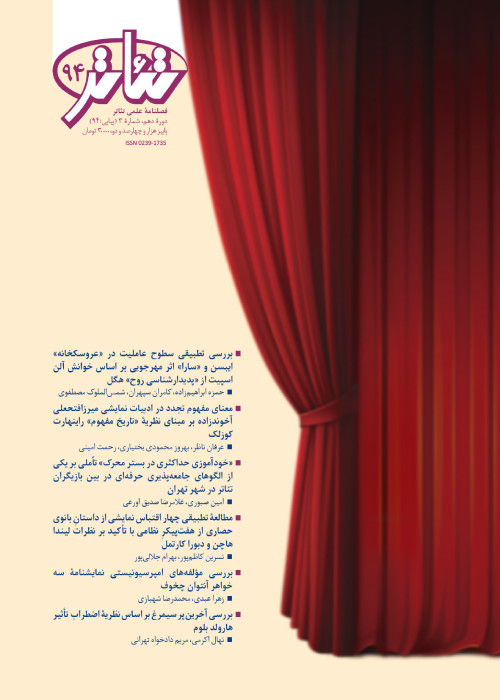The Effect of the Discourse of Orientalism in Reverse on the Representation of the Ideological Body in Iranian Dramatic Literature
One of the interdisciplinary discourses that have a great influence in dramatic literature and among Iranian playwrights is the discourse of Orientalism and especially “ Orientalism in Reverse.” Orientalism in Reverse, unlike Orientalism, which defines the East from the perspective of the Westerners, wants the Orientals to know themselves and deal with the formation of the West, which is inherently different and in conflict with the original and true values of the East, and protect the original East against the expansion and dominance of modernity. Influenced by this approach, since the 1340s, plays have emerged that represent eastern values against western ones and reveal them through “words, actions and objects.” By the dominance of orientalism on the thought of playwrights, the image of the characters’ bodies represented in Iranian dramatic literature is not excluded from this approach, and, based on the Orientalism in Reverse, the characters’ bodies take on an ideological value. On the other hand, focusing on the ideological body in Iranian dramatic literature not only reveals the ideological side of the play, but usually in the studies conducted on Iranian playwriting, they often focus on language, narrative and characterization, and paying attention to the representation of the body in the text of the play, which is actually the first phenomenon through which man perceives the outside world and expresses his thoughts, has been neglected. On this basis and based on the discourse of Orientalism in Reverse, Iran’s dramatic literature also entered into the ideological conflict between East and West, and this had an impact on the ruling thought of the works. These manifestations can be analyzed not only in the language and ideas in the work, but also in the images and descriptions that the playwrights provide of the characters’ bodies and the signs that the characters carry on their bodies. In this paper, while explaining this ideological conflict between the East and the West centered on the body, three plays of Jafar Khan Came from the West (1300) by Hasan Moghadam, Mouse (1342) by Bahman Forsi, and Slow with Rose (1364) by Akbar Raadi, which were written in three historical periods after the constitutional revolution, the beginning of industrialization, and after the Islamic revolution, and which openly and covertly focus on the ideological conflict of Eastern and Western values, will be examined.
- حق عضویت دریافتی صرف حمایت از نشریات عضو و نگهداری، تکمیل و توسعه مگیران میشود.
- پرداخت حق اشتراک و دانلود مقالات اجازه بازنشر آن در سایر رسانههای چاپی و دیجیتال را به کاربر نمیدهد.


